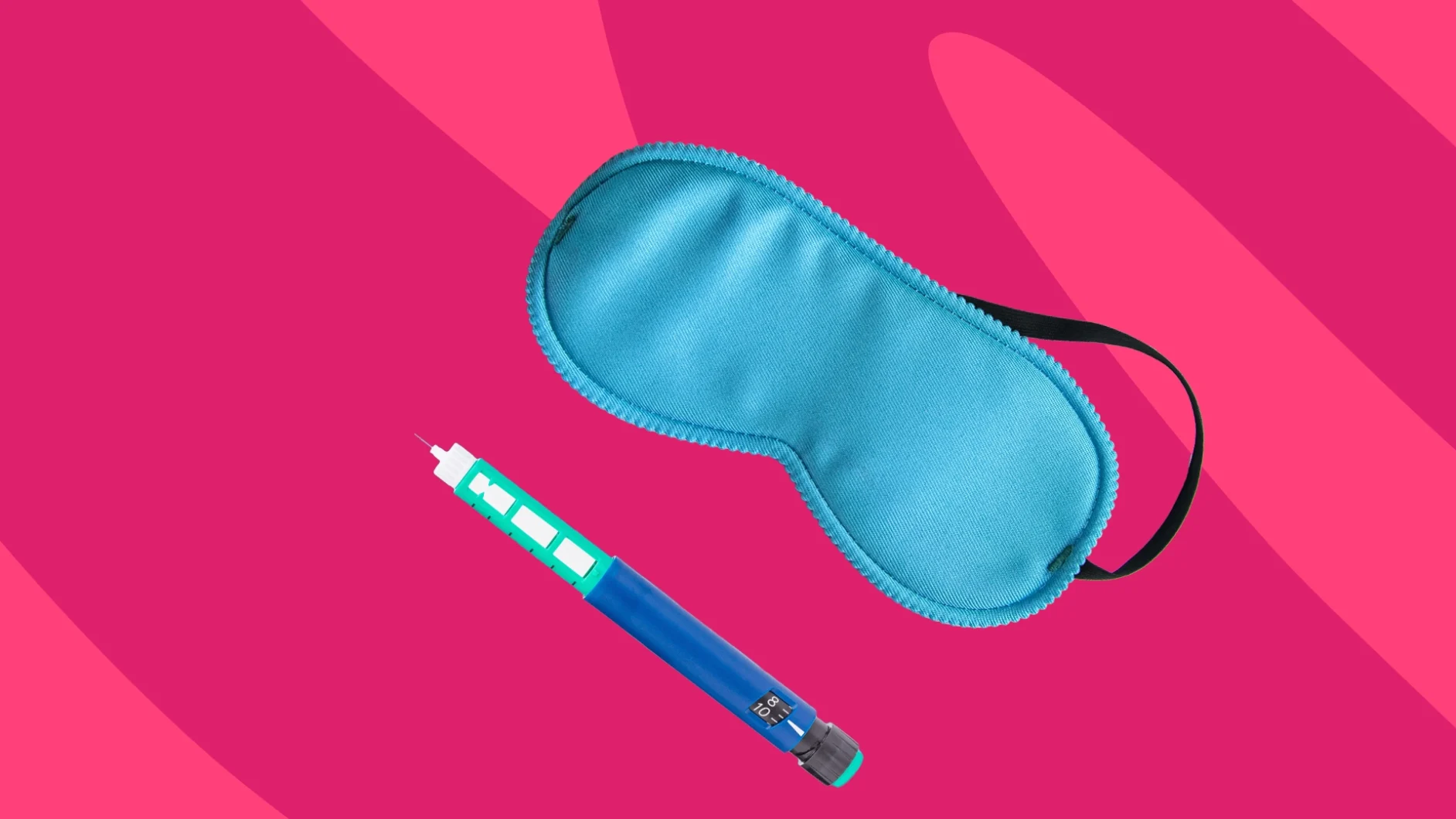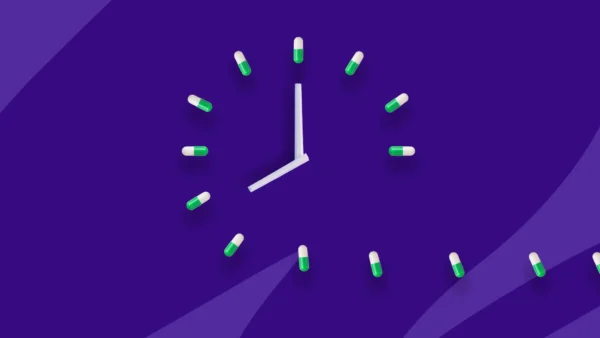Ozempic (semaglutide) is touted as a “miracle drug” for its ability to lower blood sugar for people with Type 2 diabetes and off-label to help people with obesity reach a healthy weight. It’s in a class of drugs called glucagon-like peptide-1 (GLP-1) receptor agonists that “work on a type of receptor in our small intestines,” explains Dawn Mancuso, MD, a primary care physician and medical weight loss specialist at Madison Wellness & Aesthetics Center in Madison, Alabama. “This GLP-1 receptor triggers brain and metabolic actions to help us release insulin from our pancreas, limit the release of stored glucose in our bodies, slow down our digestive systems, and, ultimately, lets our brains know we have eaten and are full.” That’s how it works its magic for blood glucose and weight loss.
The benefits are well-known—and well-documented in the popular press—but what about the potential downsides? Strange side effects, such as Ozempic face and Ozempic butt have also made the news. Are tiredness and fatigue one of them? The short answer is yes—for some people, fatigue is expected with this injectable medication.
Does Ozempic make you tired?
“In clinical trials, Ozempic caused fatigue in up to 11% of the population studied,” says Eliana Lovett, Pharm.D., a Health Outcomes Strategies Pharmacist for Walgreens, in Atlanta, Georgia. “At this time, there is no specific mechanism known for how Ozempic causes fatigue, although it is hypothesized that one reason may be the sudden plunge in blood sugar levels as people on Ozempic are eating much less and are suddenly in major calorie deficits.”
In other words, the exact reason this side effect occurs is not completely understood. It may be the decrease in food intake that helps the medication create its intended results. The good news is that for most people, it’s temporary.
“A small percentage of people report a fatigue or tiredness that lasts a few weeks after starting,” Dr. Mancuso explains. It’s most common while you’re increasing the dosage in the first two to six weeks of starting the medication. “In general, many of Ozempic’s side effects are greater during the first two to six weeks of initiation or titration (i.e., increasing dose) and will taper off after that,” Dr. Lovett says. As your body and metabolism adjust to Ozempic and your decreased calorie intake, these feelings of drowsiness and fatigue will also begin to dissipate.
It all boils down to how Ozempic affects your body: “The way Ozempic works is by both decreasing appetite and helping your body be more sensitive to insulin and release less glucagon—controlling your blood sugar,” Dr. Lovett explains. “Because it is affecting various different processes in the body, it does take time for your body to acclimate, which is why fatigue symptoms may peak around two to six weeks.” This is very common for other diabetes medications as well.
How to improve fatigue
Luckily, there are ways to help overcome Ozempic tiredness and stabilize your energy levels—with these strategies.
Stay hydrated
“The easiest way to combat this fatigue is to be sure you are staying hydrated,” Dr. Mancuso says. Drinking enough water helps your body maintain proper function. It can also help flush out your system, which may offer relief from some of the other most common side effects, such as stomach pain and bloating.
Improve your sleep quality
It may seem obvious, but getting more rest can help combat Ozempic-related tiredness. “Sleeping adequately—and that includes making sure not to eat too close to bedtime—also helps improve fatigue,” Dr. Mancuso explains. When you’re resting enough, it can help your body acclimate to the medication more effectively.
Focus on nutrition
“Along with eating a healthy diet, focus on taking in adequate protein,” says Dr. Mancuso. “This will help avoid muscle loss while your body adjusts to a reduced calorie intake.” Just be sure to avoid certain types of food that can make the side effects of Ozempic worse, such as greasy foods, sugary foods, processed foods, and certain cruciferous vegetables if you are having gastrointestinal side effects.
Get regular exercise
“Staying active with regular exercise as best you can may help,” says Dr. Mancuso, who suggests going for a walk—even if you feel too tired to hit the gym. “This physical activity will help boost metabolism, improve mental health, support heart health, and improve your quality of sleep.”
Make sure to “go” regularly
“Keeping a good bowel regimen can also help improve symptoms of fatigue,” says Dr. Mancuso, “as these compounds can slow the entire gastrointestinal tract when not excreted regularly,” and affect weight management. Stay regular by consuming enough fiber, staying hydrated, and taking a stool softener, such as docusate.
Take B12 supplements
“Alongside Ozempic, many doctors recommend taking B12 to aid with blood sugar, energy, and overall metabolic processes in the body,” Dr. Mancuso says. If you’re experiencing extreme drowsiness from Ozempic, that’s something you could discuss with your healthcare practitioner or pharmacist.
Check for drug interactions
Dr. Lovett says getting a look at the bigger picture can also help: “Review your medication list with your doctor and pharmacist to make sure there is no drug interaction that is exacerbating the issue.” Be sure to tell your doctor about all the medications you take, including Rx and OTC medicines, vitamins, and supplements. Because Ozempic affects gastric emptying, you may need to adjust the timing of your meds. Your healthcare provider can guide you on this.
Common Ozempic side effects
Everyone will react differently to the medication, but potential common side effects of Ozempic include:
- Abdominal pain
- Constipation
- Diarrhea
- Nausea
- Vomiting
- Fatigue
- Low blood sugar
- Gas
Less commonly, Ozempic users may experience injection site reactions (such as discomfort or redness), allergic reactions, or other serious side effects. If you have hives, difficulty breathing, or facial swelling, get emergency medical help.
“Since the most common side effects of Ozempic are related to upset stomach, staying hydrated, eating small meals frequently, and getting the recommended intake of fiber may all be beneficial at minimizing those side effects,” Dr. Lovett says. As an added bonus, many of these strategies also combat Ozempic fatigue and can help reduce bloating and keep blood glucose levels more stable.
The bottom line: Fatigue can be managed
There’s a chance Ozempic will make you feel tired, but extreme fatigue caused by Ozempic shouldn’t last more than six weeks. If you’re dealing with tough fatigue symptoms, certain strategies can help. And, remember that the tiredness you’re feeling is likely a result of reduced blood sugar and lower calorie intake—all benefits of this drug in action.
Of course, if your fatigue is severely affecting your life or you’re experiencing new medical conditions upon taking Ozempic, contact your healthcare provider immediately.
Sources
- Ozempic® Semaglutide Injection Patient Brochure, Novo Nordisk (2023)
- Semaglutide, PDR (2023)
- Water, hydration and health, Nutrition Reviews (2011)
- Exercising for better sleep, Johns Hopkins Medicine
- Is eating before bed bad for you?, Cleveland Clinic (2022)
- Natural ways to relieve constipation, Harvard Health (2023)
- Vitamin B12 deficiency induces glucose intolerance, delays peak insulin levels and promotes ketogenesis in female rats, Journal of Endocrinology (2023)











